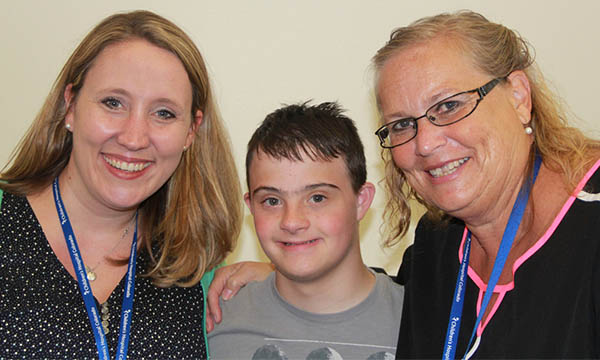Education expert provides 5 tips to help parents with school team conversations
As we get through our first two months back to school after the holidays, it is hard to believe we are on our way to summer break! In my role as the Education Specialist for the Sie Center for Down Syndrome at Children’s Hospital Colorado, I have the privilege of working with amazing  kids, families and schools from all over the country in regards to their academic skill progression and school programming. It is at this time of the year, that I tend to find families entering into more challenging conversations with their school teams regarding instruction, growth and next steps for their child. Here are a few tips to help with these courageous conversations:
kids, families and schools from all over the country in regards to their academic skill progression and school programming. It is at this time of the year, that I tend to find families entering into more challenging conversations with their school teams regarding instruction, growth and next steps for their child. Here are a few tips to help with these courageous conversations:
1.) Build relationships
Even though we are half way through the year, it is important as the year progresses to continue to take some time to get to know the team members that are working with your child each day. In order to have an effective and open team, I believe it is important to get to know your child’s teachers and service providers, and their preferred methods of communication.
- When is the best time of day to connect with them?
- What mode of communication works best?
There is less of a chance of misunderstanding or misinterpretations if everyone on the team knows and understands each other.
2.) Ask all your questions
Before heading into a meeting with your school team, make sure you take the time to review your child’s IEP and any, or all current paperwork. I tend to ask my families to look at them on their own and keep track of questions you have while reading through them. Once you have reviewed them individually, take time to sit down with your spouse or family support person and talk through the questions you both have to ensure nothing is being missed. Remember, to make the time to ask every question. IEP meetings are full of acronyms and jargon that may not make a lot of sense. Take a moment to stop the discussion and ask:
- “What does this mean for my child?”
Try to remember that the teachers and school staff are involved to help and support your child, even if you may not agree with them.
3.) Become a part of the school community
Of course IEP meetings and parent-teacher conferences are good opportunities to talk with the school team and learn about your child’s progress, but I would challenge you to look at other places to get involved in the school as well (and not just within the special education setting). What about the PTA, or the School Accountability Committee? By volunteering to be a part of those groups, you are allowing your voice as a parent of a child with Down syndrome to help guide discussion around curriculum changes, teacher staffing and the overall ‘mind-set’ of your school community.
4.) Plan for next steps (but be ready for the curve in the road)
Always be open with your team about the next instructional goals you have for your child. I believe it is important to continue to have a target to push towards so that we do not settle with our expectations.
5.) Celebrate
High Five, Fist Bump and Cheer every little success and step forward – not only does your child need that encouragement, but so does the staff working with him or her each day. When you see your child demonstrating a new skill at home that they have generalized from the school environment, share it with the team. Nothing feels better than getting to step back and taking a moment to see just how many little steps have come together to form a leap!

 Experience our inspirational and groundbreaking videos and photos. Our children and self-advocates are beautiful AND brilliant!
Experience our inspirational and groundbreaking videos and photos. Our children and self-advocates are beautiful AND brilliant! Make sure your local Representatives are on the Congressional Down Syndrome Task Force.
Make sure your local Representatives are on the Congressional Down Syndrome Task Force.